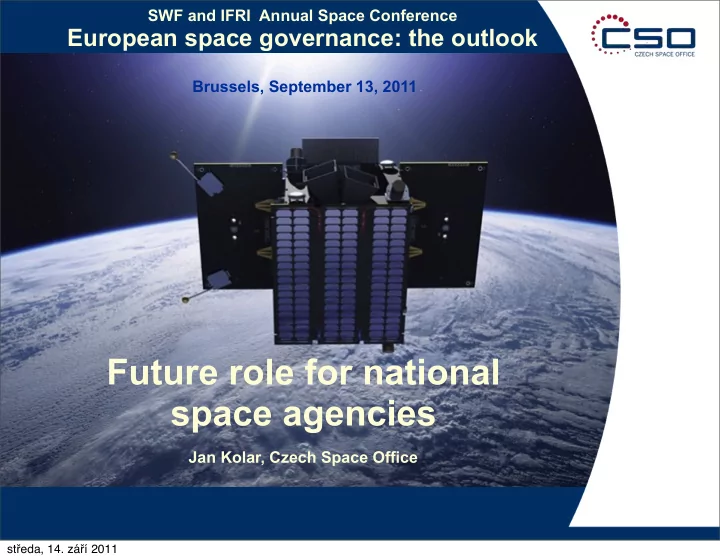

SWF and IFRI Annual Space Conference European space governance: the outlook Brussels, September 13, 2011 Future role for national space agencies Jan Kolar, Czech Space Office st ř eda, 14. zá ř í 2011
Creation of National Space Agencies National space agencies were created with and by space age. National target: to obtain benefits specifically connected to space activities To reach the target it required to address following challenges: • Space puts high demands in terms of technology, science, management • National capabilities in these areas need to be mobilised and developed • Effective inclusion of national capacities into international cooperation • National public finances to be used efficiently and for national interests Result: creation of a national central body dedicated for space activities 3 st ř eda, 14. zá ř í 2011
Space agency - national infrastructure Having the same main target, national agencies are not the same, they differ in: size, scope of activities, legal status, responsibilities, financing model Another common task: to ensure that through national agency, the country speaks with single voice in all international fora backed up by single overall budget for space activities. Final success in reaching the target does not depend on the name “agency” but on the internal quality of work and external conditions, namely: • being accepted and respected across the governmental level • having a clear specification of goals/deliveries - national policy If working well, national space agency is valuable national asset (due to expert knowledge, skills) being part of overall national infrastructure for inovation. 4 st ř eda, 14. zá ř í 2011
European space infrastructure Europe has unique intergovernmental space infrastructure consisting of network of national agencies collaborating through ESA under specific rules of function. In parallel to national level, the infrastructure is valuable European asset , proved to be successful and useful for European countries. EU becomes active another European space actor creating own structure for decision-making on EU space activities. To efficiently control processes in EU regarding space, it is another reason for every member state to have its good- working national space body. It is on member states that European Union’s space affairs should coexist with existing European space infrastructure with responsibilities held by ESA and individual countries. Member states are still interested to invest in their own priority programs through ESA despite the European treaty. Strong reason for that is that ESA’s geographic return permits even small countries to participate in the space development activities and consequently to get access to derived benefits. 5 st ř eda, 14. zá ř í 2011
Time for change It is time to consider some changes in Terms of Reference of a space agency Reasons for changes stems from simple fact that the term “space activities” includes now incomparably more topics then couple of decades ago. Space business grows and spreads out to fields where in the first look it is hardly recognisable. If we imagine space activities as a pyramid then its size enlarged tremendously during period of time when national space agencies exist to include much more topics, partners, actors, duties then agencies dealt with, originally. It is because almost usually all national space activities are governed by an agency. With this centralistic feature, an agency could become cumbersome mastodon organisation absorbing competencies and duties from sector ministries, with all negative consequences. 6 st ř eda, 14. zá ř í 2011
Different role for national agencies Agencies should evaluate how far to expand original scope of topics, i.e. how far they should be involved in security, telecom, meteorology, Earth observation services, etc. Space agencies should be mainly responsible for running edge-cutting R&D programmes (typically exploration, scientific research in space, human spaceflight), as necessary condition to ensure future space-derived benefits to citizens. In second place, agencies could support an effort of governmental users to build, to operate and/or to use developed space-based systems and services but financial and decisional management of those programmes should be fully on respective users. 7 st ř eda, 14. zá ř í 2011
Thank you for your attention www.czechspace.cz st ř eda, 14. zá ř í 2011
Recommend
More recommend